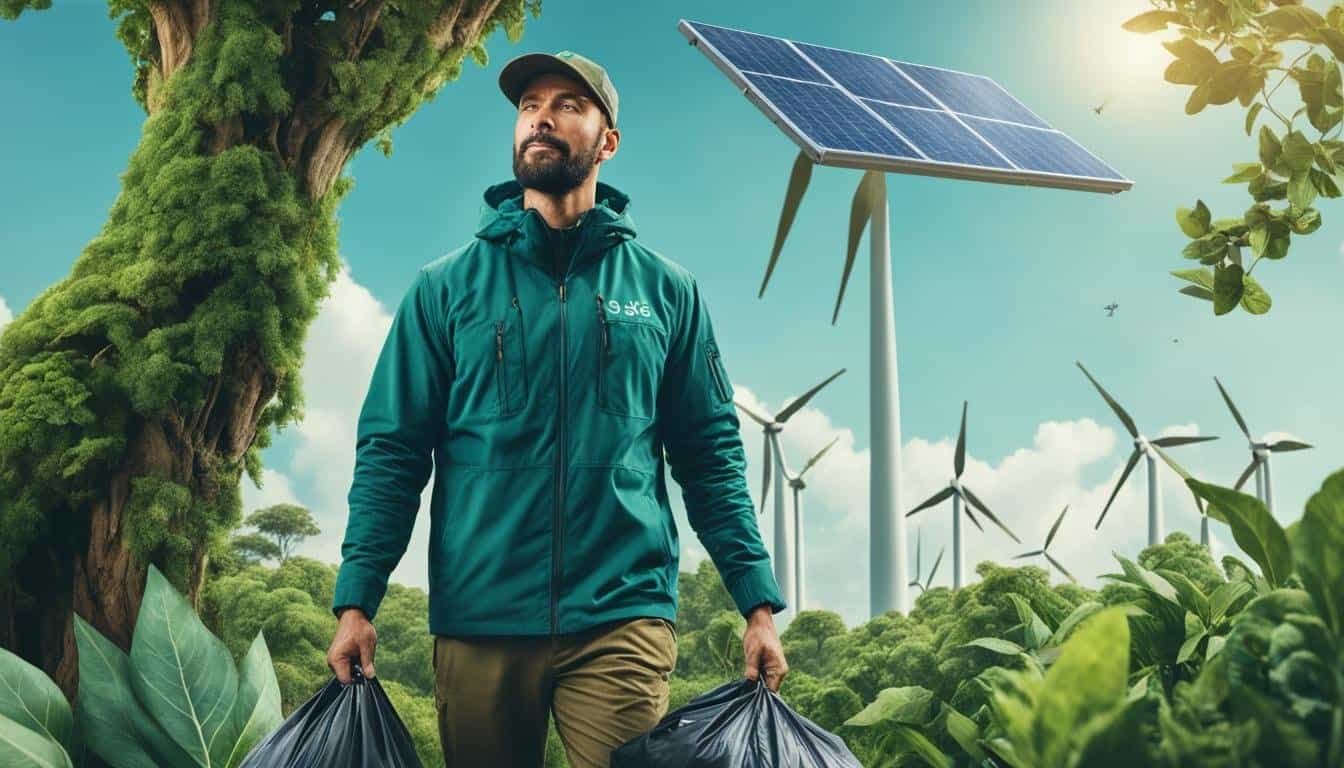The Impact of Sustainability on Personal Branding and Career Success
Sustainability is not only a crucial aspect of our global future, but it has also become an influential factor in personal branding and career success. Embracing sustainability as a mindset and lifestyle can shape your personal brand, connect you with like-minded individuals, and pave the way for a successful career in a rapidly changing world.
Building a personal brand centered around sustainability allows professionals, students, and hobbyists to align their values and vision for the future with their career goals. By showcasing your commitment to sustainability, you not only attract the attention of employers and clients who share your values but also differentiate yourself in a crowded marketplace. In an era where consumers and investors prioritize brands that prioritize sustainability, a strong personal brand in this area can be a game-changer.
Defining your niche within the sustainability field is the first step to building a personal brand. Whether it’s sustainable fashion, renewable energy, circular economy, or urban gardening, finding your area of expertise helps you narrow down your target audience and create a powerful message. By positioning yourself as a knowledgeable and passionate advocate in your niche, you can leverage your personal brand to address the pressing needs and challenges of your target market.
Creating valuable content is another critical aspect of building a sustainable personal brand. Through blog posts, videos, podcasts, social media, and more, you can share information, insights, and inspiration that resonate with your audience. By addressing their pain points, providing solutions, and showcasing your impact in the field, you establish yourself as a credible and valuable resource in the sustainability space.
Networking plays a vital role in personal branding and career success in sustainability. By actively engaging with like-minded professionals, joining communities and events, and collaborating on projects, you expand your reach and opportunities. Building a strong network not only helps you learn from others but also opens doors to potential partnerships and collaborations that can amplify your personal brand and accelerate your career growth.
Key Takeaways:
- Embracing sustainability can boost personal branding and career success
- Defining a niche within the sustainability field helps narrow down your target audience
- Creating valuable content showcases your expertise and impacts
- Building a network in sustainability expands opportunities and knowledge-sharing
- Authenticity and consistency are paramount in sustainable personal branding
Why Sustainability Matters in Personal Branding
Embracing sustainability enhances personal branding and propels career success in today’s eco-conscious marketplace. Consumers and investors are increasingly seeking brands that align with their values, and sustainability has become a critical component of a successful brand.
With the growing awareness of environmental and social issues, individuals are recognizing the importance of incorporating sustainability into their personal brand. By doing so, they not only appeal to a wider audience but also contribute to a more sustainable future. Sustainable personal branding is not just a trend; it is a strategic approach that resonates with the values and aspirations of individuals and society as a whole.
Building Trust and Loyalty
When personal branding incorporates sustainability, it creates a sense of trust and authenticity among the audience. Consumers are more likely to engage with brands that prioritize environmental and social responsibility. By showcasing sustainability practices and values, individuals can build a loyal following that believes in their commitment to making a positive impact.
“Sustainability is not just about reducing carbon emissions or using eco-friendly materials. It’s a holistic approach that encompasses transparency, ethics, and the well-being of people and the planet. When your personal brand reflects these values, it becomes a powerful tool for connecting with like-minded individuals and attracting career opportunities.” – Sarah Johnson, Sustainability Consultant
Standing Out in a Competitive Market
In today’s competitive job market, personal branding is more important than ever. By integrating sustainability into personal branding, individuals differentiate themselves from the competition by showcasing a unique and compelling value proposition. Employers and clients are increasingly seeking professionals who can bring a sustainability perspective to their work, making sustainable personal branding a valuable asset.
Showcasing Values and Expertise
Sustainable personal branding allows individuals to showcase their values and expertise in a way that aligns with their personal and professional goals. By highlighting sustainability initiatives, projects, and accomplishments, individuals demonstrate their commitment and proficiency in addressing environmental and social challenges. This enhances their credibility and positions them as thought leaders in their field.
By incorporating sustainability into personal branding, individuals can not only create a positive impact but also elevate their career success. The next section will explore how to define your niche in sustainability, which is a crucial step towards building a strong and impactful personal brand.
Defining Your Niche in Sustainability
The first step in building a personal brand in sustainability is to identify your niche. This involves choosing a specific area of interest and expertise within the sustainability field, such as sustainable fashion, renewable energy, circular economy, or urban gardening.
By defining your niche, you can focus your efforts and establish yourself as an expert in a particular aspect of sustainability. This not only sets you apart from others but also allows you to connect with a target audience who shares your passion and values.
When determining your niche, consider your skills, knowledge, and personal interests. Think about what aspects of sustainability excite you and where your expertise lies. This will help you narrow down your focus and create a more impactful personal brand.
Target Audience
Defining your niche also helps you understand your target audience better. By specializing in a specific area of sustainability, you can tailor your message and value proposition to resonate with the needs and challenges of your target market.
For example, if your niche is sustainable fashion, your target audience may consist of environmentally conscious consumers who are looking for eco-friendly clothing options. By addressing their specific concerns and offering solutions, you can build a strong connection with your audience and establish trust.
Message and Value Proposition
Once you have defined your niche and identified your target audience, it is important to craft a clear and compelling message that communicates your value proposition. Your message should highlight how your expertise and unique perspective in sustainability can benefit your audience.
Consider what sets you apart from others within your niche. What unique insights, experiences, or skills do you bring to the table? How can you solve the problems and address the needs of your target audience better than anyone else?
“Defining your niche helps narrow down your target audience, message, and value proposition. It allows you to showcase your skills, knowledge, and passion while addressing the needs and challenges of your target market.”
By clearly defining your niche, understanding your target audience, and crafting a compelling message, you can build a sustainable personal brand that effectively resonates with your audience and sets you on the path to success in the world of sustainability.
Creating Valuable Content in Sustainability
When it comes to building a personal brand in sustainability, creating and sharing valuable content is essential. Content plays a crucial role in engaging with your audience, establishing credibility, and showcasing the impact of your work.
Content can take various forms, catering to different audience preferences and platforms. Whether it’s blog posts, podcasts, videos, infographics, newsletters, or social media posts, the key is to provide useful, engaging, and relevant information.
One effective strategy is to address common problems, questions, or challenges that your audience may face. By offering practical solutions and guidance, you position yourself as a valuable resource and establish trust with your audience.
Sharing Projects, Achievements, and Collaborations
Apart from providing educational content, it’s also important to showcase your own projects, achievements, and collaborations. This allows you to demonstrate the impact and credibility of your work in the sustainability field.
Highlighting successful projects or initiatives you have undertaken gives your audience a tangible example of how you are making a difference. It can inspire them to take action or even collaborate with you on future endeavors.
A great way to do this is through case studies or success stories. By sharing testimonials or feedback from satisfied clients or partners, you build social proof and enhance your personal brand’s reputation.
“The best way to predict the future is to create it.” – Peter Drucker
By sharing stories of your personal journey and experiences, you create a connection with your audience. It allows them to relate to you on a deeper level, increasing their trust and loyalty towards your personal brand.
Remember, valuable content goes beyond just sharing information. It should be well-researched, well-written, and visually appealing. By investing time and effort into creating high-quality content, you position yourself as an authority in the sustainability space, attracting more opportunities for professional success and personal growth.
Types of Valuable Content in Sustainability
| Content Type | Description |
|---|---|
| Blog Posts | Informative articles discussing sustainability topics, trends, and solutions. |
| Podcasts | Audio conversations featuring industry experts, thought leaders, and inspiring individuals in sustainability. |
| Videos | Engaging visual content showcasing sustainable practices, innovations, or interviews. |
| Infographics | Visually appealing graphics presenting complex sustainability concepts, data, or statistics. |
| Newsletters | Timely updates, insights, and curated content delivered directly to subscribers’ inboxes. |
| Social Media Posts | Short, snackable posts sharing quick tips, inspiration, or news related to sustainability. |
By diversifying your content across different formats, you are able to reach a wider audience and cater to their preferences. Be consistent in delivering valuable content, ensuring it aligns with your personal branding goals and resonates with your target audience.
Remember, sustainability is a journey, and your content should reflect that. By continuously providing value and insights, you can make a lasting impact in the sustainability space and pave the way for your own professional success and personal development.
Building a Network in Sustainability
Building and nurturing a network of contacts, collaborators, and supporters is crucial for personal branding and career success in sustainability. Networking allows for expanding reach, learning from others, finding opportunities, and creating impact.
Here are some effective ways to build your network:
- Join Communities: Participate in online and offline communities, groups, forums, or events related to sustainability. Engage in discussions, share insights, and connect with like-minded individuals.
- Reach Out to Influencers and Peers: Connect with influencers, industry experts, and peers in the sustainability field. Share your interests, ideas, and achievements to establish valuable connections and learn from their experiences.
- Engage with Content: Actively engage with sustainability-related content on social media platforms, blogs, and websites. Comment, share, and contribute to the conversation to build relationships with content creators and fellow enthusiasts.
- Collaborate on Projects: Seek opportunities to collaborate on sustainability projects, initiatives, or campaigns. Working with others not only expands your network but also fosters innovation and creates a greater impact.
“Networking is not about just connecting people. It’s about connecting people with people, people with ideas, and people with opportunities.” – Michele Jennae
Remember, building a network is an ongoing process. Continuously nurture and strengthen your relationships, offer support to others, and be open to new connections. By building meaningful connections in the sustainability community, you can enhance your personal brand and unlock new career opportunities.
Being Authentic and Consistent in Sustainability
Building a personal brand in sustainability requires authenticity and consistency. By being honest, transparent, and genuine in communication, actions, and values, individuals can establish trust, loyalty, and reputation among their audience and network.
Authenticity means being true to oneself and showcasing uniqueness in storytelling and content across various platforms. It involves staying true to one’s values and beliefs while creating a personal brand that aligns with sustainability principles.
Consistency is equally important in sustaining personal branding success. It involves delivering on promises, maintaining quality standards, and aligning words and deeds with one’s mission and vision. Consistency helps build credibility and reliability, positioning individuals as trustworthy and dependable in the sustainability space.
Being authentic and consistent in sustainability not only strengthens personal branding but also fosters meaningful connections and impactful collaborations within the sustainability community. It allows individuals to attract like-minded individuals and organizations who share the same values and aspirations.
“Authenticity is a collection of choices that we have to make every day. It’s about the choice to show up and be real. The choice to be honest. The choice to let our true selves be seen.” – Brené Brown
By embodying authenticity and consistency in personal branding efforts, individuals can effectively communicate their sustainability journey and inspire others to embrace a sustainable lifestyle. This creates a positive ripple effect, contributing to a more sustainable future for all.
Learning and Improving in Sustainability
Continuous learning and improvement are essential for personal branding and career success in sustainability. As the field of sustainability is dynamic and ever-evolving, professionals must stay abreast of new ideas, trends, and challenges to make a meaningful impact and enhance their skills and knowledge.
One valuable way to learn and improve in sustainability is by embracing feedback. Whether it’s from mentors, peers, or the audience, feedback offers insights into areas of improvement and facilitates growth. By humbly accepting feedback and actively seeking it, professionals can refine their approach, innovate, and adapt to the changing landscape of sustainability.
Another effective learning method is drawing inspiration from successes and failures in the sustainability field. By understanding what worked and what didn’t, professionals can evaluate strategies, identify gaps, and refine their personal branding efforts. Learning from past experiences helps individuals refine their approach and avoid repeating mistakes, ultimately contributing to continuous professional growth.
Mentors also play a vital role in personal growth and development in sustainability. Engaging with experienced professionals who have already made significant strides in the sustainability niche can provide valuable guidance, advice, and perspective. Mentors can share their expertise, offer career insights, and inspire professionals to take their personal branding to new heights.
“The key to personal branding in sustainability is a growth mindset. Always be open to new ideas, challenges, and learning opportunities. Embrace the feedback, draw inspiration from successes and failures, and seek guidance from mentors. By continuously learning and improving, you can establish yourself as a trusted and influential voice in the sustainability space.”
Peer learning and collaboration are also impactful aspects of personal development in sustainability. Engaging with like-minded individuals and participating in communities or professional networks focused on sustainability can foster knowledge exchange, provide access to valuable resources, and cultivate a sense of belonging within the sustainability community.
In summary, continuous learning and improvement are crucial for personal branding and professional success in sustainability. By embracing feedback, learning from successes and failures, seeking guidance from mentors, and collaborating with peers, individuals can enhance their skills, stay relevant, and make a lasting impact in the sustainability niche.
Defining Your Role in Sustainability
In the pursuit of sustainability, it is crucial for companies to self-evaluate and understand their role within the sustainability ecosystem. This self-reflection allows businesses to align their practices and strategies with sustainable principles, setting the stage for long-term success.
Depending on the size and scope of the company, there are various ways in which it can contribute to sustainability. Some organizations may focus on making their core business operations more sustainable by incorporating eco-friendly practices and minimizing their carbon footprint. Others may prioritize enabling a transition to a better future by investing in renewable energy sources or promoting social responsibility.
While some companies may directly impact the environment through their business model, it is important to approach sustainability with intention and purpose. Sustainability should not be seen solely as a marketing tool but as a mindset that permeates every aspect of a company’s operations.
Building brand perception and obtaining a social license to operate in the modern business landscape requires a deep understanding of how sustainability aligns with corporate strategy. By integrating sustainability principles into their core values and practices, businesses can foster trust, loyalty, and credibility among their stakeholders.
Conclusion
Embracing sustainability in personal branding is a key factor in achieving career success. By aligning values and vision with a niche in sustainability, individuals can establish a strong and sustainable personal brand. Creating valuable content, building a network, and being authentic and consistent further enhance the brand’s impact.
Continuous learning and improvement are crucial in the dynamic field of sustainability. Staying updated with trends, seeking feedback, and learning from successes and failures contribute to professional growth and enable individuals to stay relevant and influential.
Companies also play a vital role in integrating sustainability into their brand identity. By self-evaluating their role in the sustainability ecosystem, reporting on environmental, social, and governance practices, and communicating their sustainable vision effectively, companies can build brand perception and establish a social license to operate.
Overall, sustainability and personal branding are intricately connected, offering opportunities for career success and making a positive impact on society. By embracing sustainable practices and continuously nurturing their personal brand, individuals and companies can contribute to a more sustainable future while achieving growth and success.







